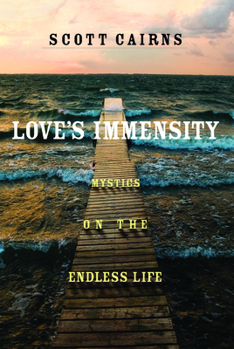Love's Immensity: Mystics on the Endless Life
Select Format
Select Condition 
Book Overview
A selection of luminous texts from early mystical fathers and mothers, whose words are considered inexhaustible, generative powers, unites in their common claim that Love is the most compelling name of God. $10,000 ad/promo.
Format:Paperback
Language:English
ISBN:1640605886
ISBN13:9781640605886
Release Date:April 2020
Publisher:Paraclete Press (MA)
Length:162 Pages
Weight:0.45 lbs.
Dimensions:0.4" x 5.5" x 8.3"
Customer Reviews
2 ratings
Pause, listen and rest the presence of these poems
Published by Thriftbooks.com User , 15 years ago
Love's Immensity - Mystics on the Endless Life by Scott Cairns We are but dim reflections of a love so true, a light so pure, a life so alive. Created in the image of God, we still carry the haunting beauty of his touch despite our falling and failing. Reading Scott Cairns' new volume of poetry, "Love's Immensity," I am reminded of the hope of restored glory that shines from our "gleaming Liberator Jesus Christ." Drawing from the writings of early Church Fathers, desert monastics and Medieval mystics, Cairns weaves a wondrous cord of images and words that capture the beauty of our creation and restoration through God's transforming presence. Translating always offers challenges for the reader and the writer. Are we reading the translator or the original writer? How does a translator capture ideas that are not translatable? Cairns addresses some of this complexing challenge by addressing the challenge of translating "nous," a word common in early church and Eastern Orthodox writings. This multi-layered idea is not easily translated. When we interpret "nous" as mind or heart, we tend to rob the word of nuanced implications by reducing the meaning to our deficient and disconnected understanding of mind and body. So Cairns writes, "There is one word .. that I have decided for the most part not to translate at all, hoping that we might acquire a renewed sense of the word itself, and hoping that we might dodge the diminishments of its uniformly unsatisfactory translation." Since "nous" and "noetic prayer" are fundamental ideas in many ancient writings, it worthwhile to try and penetrate some of what the New Testament and early church writers meant when they used this word. Cairns attempts to open the richness of the word by explaining it as follows: It is the center of the human person, where mind and and matter meet most profoundly, and where the human person is mystically united to others and God. I have written elsewhere that an "individual does not a person make." Personhood--if the Image of God is relevant here--is revealed in relationship, and the nous is the faculty that enables and performs just such a relationship. (xiv) That succinct explanation conveys the richness and the beauty of this word. It is a hint of the beauty that is to come as Cairns begins to unfold the prayers and teachings of our forebears. Again and again I am drawn to his phrasing that brings alive the beauty of these writers that has often been hidden in the dusty translations of scholarship. Capturing the provocative spirit of Athanasius, he uses words like "dim occasions," "slow senses" and "beloved numbskulls" to address the slow and struggling people of God. In spite of our blindness, God makes a way for us to see. So we hear Athanasius proclaim, "As we had turned from cosmos--the beauty above, light-laden--and sought Him in the muck among created things, the God in His great love took to Himself an earthen body." God comes to meet in the midst of slow and dim
Lovely and Helpful.
Published by Thriftbooks.com User , 16 years ago
If you are looking for a book of "poems" that will stand out independently as works of "art," then I would say that this is not your book. If you want a representative anthology of writings from the mystics that will give you all the right information (and there's nothing wrong with that), then look elsewhere. However, this is a lovely and very useful collection. These are poetic studies of writings from primarily the Christian mystical tradition--and with an Orthodox sensibility. They are also prayers themselves. Cairns uses poetry both to resurrect the poetry of the originals and to think them anew by rethinking, remaking them. In the mystical tradition, there is a practice of reading as prayer, and Cairns is writing in this tradition. When one reads these poems, one is focusing not only on the poems themselves, but also on the leading in the poems, and one is looking toward where the leading is leading. One is trying to take direction from this poetry. The point is to make spiritual friends of these writers, to participate in their movement toward God. Beauty and art and intelligence are part of this, but they are what they are only as they lead one further into God. This book is not for everyone. It requires one to slow way down, to participate in re-blazing the paths these writers blazed. It also requires, I believe, a familiarity with Christian tradition and its history, and certainly an openness to its spirituality--and all of these are growing rarer. In addition, of course, one must also be open to Cairns's own specific poetic--he has very a bodied intellect and a dialogical style, full of voice and its pauses, direct addresses, questions. If you're prepared for his giving, there is quite a current of receiving to step into here. If not, there are other trails, but none of them are especially easy to climb onto.





